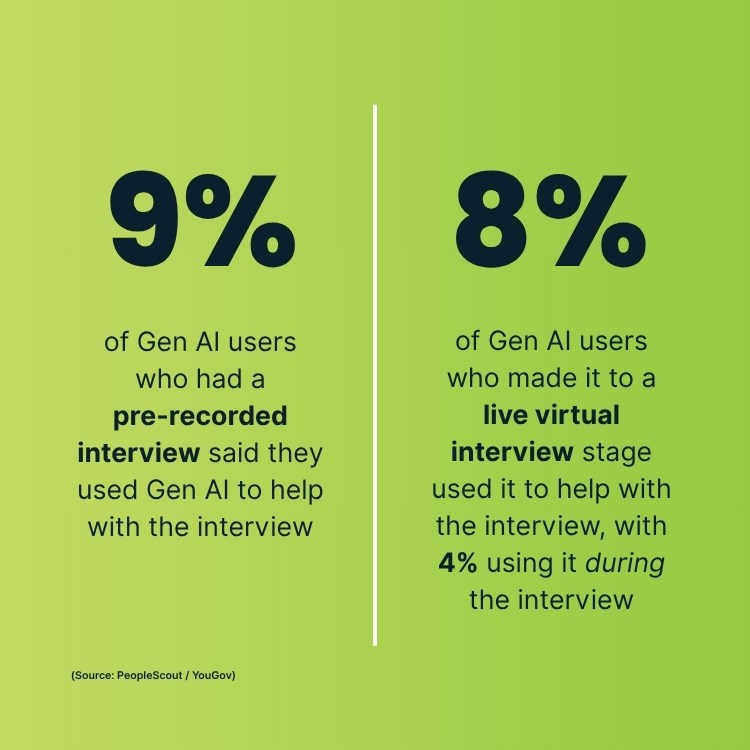The use of generative AI (Gen AI) amongst job seekers has sparked significant interest in the media, with numerous tools now available to enhance résumés, CVs, cover letters and interview preparation. Yet, our recent research, The AI-Enabled Applicant: How Candidates Are Really Using Gen AI in Recruitment, reveals that only one in five UK job seekers currently utilizes Gen AI during their job search.
Despite this relatively low adoption rate, organisations face a growing challenge: how to navigate a landscape where applications and interview responses may be AI-enhanced or even AI-created. How can employers ensure they’re selecting the best human talent rather than simply the candidates with the most effective AI assistance?
This article, the second in our series exploring data from our report, examines how Gen AI could reshape recruitment outcomes both today and in the future.
CV and Application Reliability
CVs were already known to be relatively poor predictors of future job performance due to inconsistency and bias. With 55% of UK job seekers using Gen AI to help them prepare their CV, the use of Gen AI threatens to further weaken their predictive value, as they may increasingly reflect Gen AI capabilities rather than actual candidate suitability. Many CVs now appear perfectly tailored to match the keywords and skills specified in job descriptions, further complicating the selection process. Volume recruiters also report seeing identical responses across applications, suggesting common use of Gen AI to produce non-authentic answers.
With CV sifting and standard application questions, both automated sifting tools that use word-matching and human reviewers face growing difficulty in identifying the strongest candidates. It’s difficult for both humans and AI to detect which candidates are using Gen AI to create dishonest content, versus those who are using it to enhance the presentation of original and authentic content.
Several studies have also shown that using AI to detect AI use is fraught with risk of bias against non-native English speakers. And anyone who has used online detectors will know that original text is often misclassified as 100% Gen AI produced due to the inadvertent use of a certain keyword or phrase.
This means that many candidates who are using Gen AI to produce a CV or answer typical application questions are effectively undetectable, leading to these stages quickly becoming even less reliable at establishing candidate quality. Some major employers have already begun reducing their reliance on CVs for initial candidate screening or eliminated them entirely from their processes. This trend is likely to accelerate as confidence in these documents continues to erode.
Online Test & Assessment Vulnerability
Under controlled lab conditions with well-crafted prompts, Gen AI tools have achieved passing scores on some standard online assessments including psychometric tests, producing correct or criteria-matching answers across various question types. Cognitive reasoning tests, situational judgement tests and even personality tests have been trialled to see how accurately Gen AI tools can generate correct or high scoring answers. With access to the role requirements and other company information, Gen AI tools can produce answers to some online tests that inflate the score a typical candidate might achieve.
At this point, we’re not seeing score disruption at this stage of volume assessment processes. Every method will have a different level of vulnerability. Some may be sound, and the biggest threat to their accuracy may continue to come from candidates asking other people to take the tests for them.
However, with 20% of job seekers in our survey saying they used Gen AI to complete an online test, it would be prudent for employers to periodically review and stress-test their online assessments to ensure that they are not easy to pass using Gen AI tools. If there are vulnerable areas, organisations can then introduce more robust tests and assessments to ensure their sift progresses the candidates with genuine potential for the role.
Online Interview Problem
It can be tempting to feel that abandoning online assessment methods in favour of pre-recorded or virtual live interviews would be a way of avoiding any risk of Gen AI use. Pre-recorded video interviews are likely to remain part of many volume assessment processes, valued for their efficiency and for creating opportunities to evaluate key criteria like motivation and verbal communication skills. And live virtual interviews over Zoom or Teams are common pre-assessment centre shortlisting tools, used to ensure that those invited to the assessment centre have sufficient the interpersonal skills to warrant a place in the final selection stage.
However, pre-recorded or asynchronous interview are also not completely safeguarded from Gen AI disruption. While our current data reveals low usage of Gen AI for pre-recorded or live virtual interviews, as Gen AI tools become more sophisticated, it could create greater potential risk of disruption to the expected levels of authenticity in answers.

New AI tools can ‘listen’ and provide natural responses in real-time, meaning that, if they choose, candidates can provide credible—yet made-up— answers to typical interview questions. Combined with advancements in gaze management technology, during interviews candidates can read from AI-generated responses while appearing to maintain direct eye contact with the web camera and delivering off-the-cuff answers.
Research suggests that video interviewees who read or paraphrased AI-generated responses received much higher overall interview ratings than those who did not use AI. This presents a concerning catch-22: the very methods designed to efficiently screen candidates may no longer be reliable, while the alternative of conducting more in-depth interviews will stretch recruitment timelines and budgets.
Navigating the New Recruitment Reality
Many organisations are likely to need to review their assessment tools to adopt an approach that balances efficiency with integrity. As our research demonstrates, the tension between these priorities will only intensify as Gen AI capabilities continue to evolve. Some degree of AI assistance is likely unavoidable, so employers must concentrate instead on managing its use constructively and identifying the truly human qualities that drive success in a role.
The good news is that our data indicates that it isn’t necessary to throw out everything that has helped us to find great new employees in the past. But it does show that the potential for disruption is present, and that the latest Gen AI capabilities are already being used in ways that can make it harder to tell who to hire—especially if we don’t review and evolve our assessment processes to protect the integrity of our recruitment outcomes.
Identifying vulnerabilities in your assessment process is a crucial first step for organisations seeking to maintain integrity. That why PeopleScout’s Assessment Design & Delivery team has developed our Gen AI Opportunity & Risk Assessment Audit. This thorough review of your recruitment process will identify both vulnerabilities and opportunities related to Gen AI throughout the candidate journey. Our occupational psychologists prepare a report of evidence-based recommendations so you can focus your resources on critical vulnerability points, protecting the accuracy of your selection as well as diversity outcomes.
For more Gen AI insights, download the full AI-Enabled Applicant: How Candidates Are Really Using Gen AI in Recruitment report.


